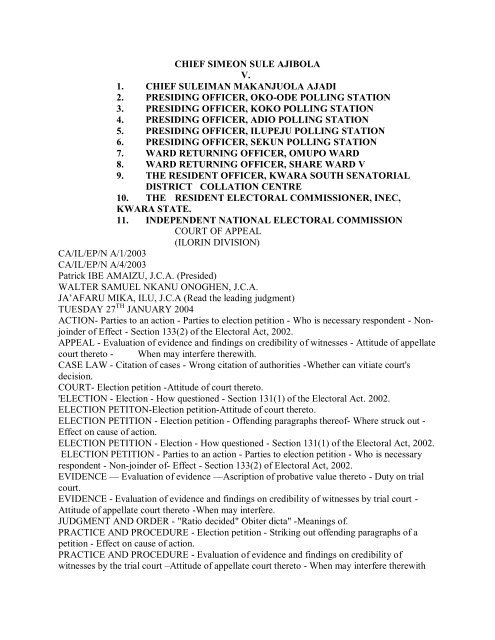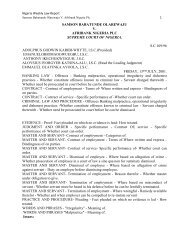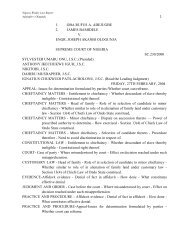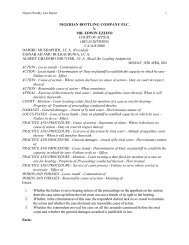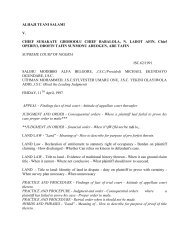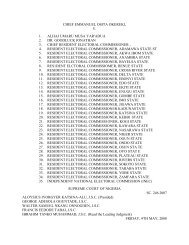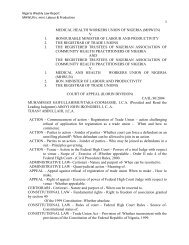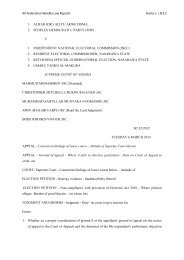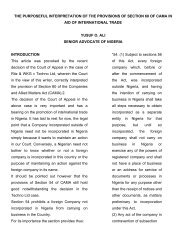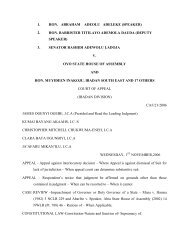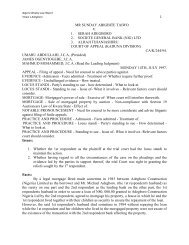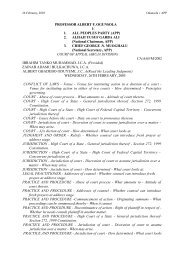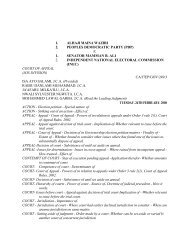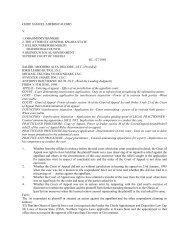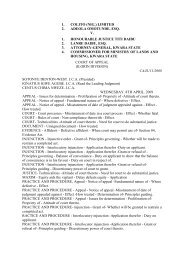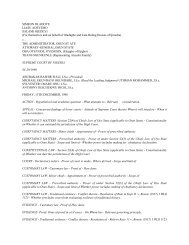Ajibola v Ajadi
Ajibola v Ajadi
Ajibola v Ajadi
Create successful ePaper yourself
Turn your PDF publications into a flip-book with our unique Google optimized e-Paper software.
CHIEF SIMEON SULE AJIBOLA<br />
V.<br />
1. CHIEF SULEIMAN MAKANJUOLA AJADI<br />
2. PRESIDING OFFICER, OKO-ODE POLLING STATION<br />
3. PRESIDING OFFICER, KOKO POLLING STATION<br />
4. PRESIDING OFFICER, ADIO POLLING STATION<br />
5. PRESIDING OFFICER, ILUPEJU POLLING STATION<br />
6. PRESIDING OFFICER, SEKUN POLLING STATION<br />
7. WARD RETURNING OFFICER, OMUPO WARD<br />
8. WARD RETURNING OFFICER, SHARE WARD V<br />
9. THE RESIDENT OFFICER, KWARA SOUTH SENATORIAL<br />
DISTRICT COLLATION CENTRE<br />
10. THE RESIDENT ELECTORAL COMMISSIONER, INEC,<br />
KWARA STATE.<br />
11. INDEPENDENT NATIONAL ELECTORAL COMMISSION<br />
COURT OF APPEAL<br />
(ILORIN DIVISION)<br />
CA/IL/EP/N A/1/2003<br />
CA/IL/EP/N A/4/2003<br />
Patrick IBE AMAIZU, J.C.A. (Presided)<br />
WALTER SAMUEL NKANU ONOGHEN, J.C.A.<br />
JA’AFARU MIKA, ILU, J.C.A (Read the leading judgment)<br />
TUESDAY 27 TH JANUARY 2004<br />
ACTION- Parties to an action - Parties to election petition - Who is necessary respondent - Nonjoinder<br />
of Effect - Section 133(2) of the Electoral Act, 2002.<br />
APPEAL - Evaluation of evidence and findings on credibility of witnesses - Attitude of appellate<br />
court thereto - When may interfere therewith.<br />
CASE LAW - Citation of cases - Wrong citation of authorities -Whether can vitiate court's<br />
decision.<br />
COURT- Election petition -Attitude of court thereto.<br />
'ELECTION - Election - How questioned - Section 131(1) of the Electoral Act. 2002.<br />
ELECTION PETITON-Election petition-Attitude of court thereto.<br />
ELECTION PETITION - Election petition - Offending paragraphs thereof- Where struck out -<br />
Effect on cause of action.<br />
ELECTION PETITION - Election - How questioned - Section 131(1) of the Electoral Act, 2002.<br />
ELECTION PETITION - Parties to an action - Parties to election petition - Who is necessary<br />
respondent - Non-joinder of- Effect - Section 133(2) of Electoral Act, 2002.<br />
EVIDENCE — Evaluation of evidence —Ascription of probative value thereto - Duty on trial<br />
court.<br />
EVIDENCE - Evaluation of evidence and findings on credibility of witnesses by trial court -<br />
Attitude of appellate court thereto -When may interfere.<br />
JUDGMENT AND ORDER - "Ratio decided" Obiter dicta" -Meanings of.<br />
PRACTICE AND PROCEDURE - Election petition - Striking out offending paragraphs of a<br />
petition - Effect on cause of action.<br />
PRACTICE AND PROCEDURE - Evaluation of evidence and findings on credibility of<br />
witnesses by the trial court –Attitude of appellate court thereto - When may interfere therewith
WORDS AND PHRASES - "Ratio decidendi" "Obiter dicta" Meanings of.<br />
Issues:<br />
1. Whether the tribunal was right to have merely struck out parts of the paragraphs of the petition and<br />
petition as prayed.<br />
2. Whether the tribunal was not wrong in refusing to avoid the elections conducted in Dupeju, Adio,<br />
Oko-Ode and Sekun polling stations or declare the votes cast thereat unlawful.<br />
Facts:<br />
The appellant contested the election to the senate seat for Kwara South senatorial district<br />
on the platform of the Peoples Democratic Party while the 1st respondent contested on the<br />
platform of All Nigeria Peoples Party. At the end of the election, the 1st respondent was declared<br />
the winner. The appellant, unhappy with the result filed a petition at the National Assembly and<br />
Legislative Houses Election Tribunal Ilorin praying that it be determined that the respondent was<br />
not duly elected; that the election was voided by acts of thuggery and rigging; and that going by<br />
the lawful votes cast, the appellant should be returned as the elected senator or alternatively that<br />
the appellant be declared winner of the election judging by the results obtained after the physical<br />
re-count by the tribunal of the votes from the affected units.<br />
The 1st respondent in his reply to the petition raised a preliminary objection on the<br />
grounds amongst which were that the petition did not disclose any reasonable cause of action and<br />
incurable defect of misjoinder and non-joinder. The other respondents raised similar objections.<br />
After hearing the parties on the preliminary objections, the tribunal granted the prayer of the 1st<br />
respondent on the incurable defect of the petition on ground of misjoinder and non¬joinder and<br />
struck some of the paragraphs of the petition out and proceeded with the trial on other paragraphs.<br />
Dissatisfied with the decision of the tribunal striking out some paragraphs of the petition, the<br />
appellant appealed to the Court of Appeal.<br />
Meanwhile, the tribunal proceeded with the conduct of the trial. At the end of the trial, the<br />
tribunal dismissed the petition and held MI the election was conducted substantially in accordance<br />
with the principles of the Electoral Act 2002 and that the non-compliance did not substantially<br />
affect the result of the election. Dissatisfied with the final decision of the tribunal, the appellant<br />
appealed to the Court of Appeal. The two appeals were consolidated. In determining the appeals,<br />
the Court of Appeal considered the provision of sections 131(1) and 133(2) of the Electoral Act,<br />
2002.<br />
―131(l) No election and no return at an election under this Act shall be questioned in any manner<br />
other than by a petition complaining of an undue election or undue return (in this Act referred<br />
to as an "election petition") presented to the competent tribunal or court in accordance with the<br />
provisions of the Constitution or of this Act, and in which the person elected or returned is<br />
joined as a party‖.<br />
―133(2) The person whose election is complained of is, in this Act, referred to as the respondent,<br />
but if the petition complains of the conduct of an Electoral Officer, a Presiding Officer, a<br />
Returning Officer or any other person who took part in the conduct of an election, such officer<br />
or person shall for the purpose of this Act be deemed to be a respondent and shall be joined in<br />
the election petition in his or her official status as a necessary party."<br />
Held (Unanimously dismissing the appeal against the decision on the preliminary objection and allowing<br />
the appeal against the final judgment):<br />
1. On Necessary parties to election petition –
By virtue of section 133(1) of the Electoral Act 2002, the necessary parties to an election petition<br />
are:-<br />
(a) a candidate at the election or,<br />
(b) a political party which participated at the election. (P. 32, paras. D-E)<br />
2. On Necessary respondent to election petition –<br />
The necessary respondents to an election petition are:<br />
(a) The person elected or returned at the election<br />
(b) Electoral officer, a presiding officer or a returning officer whose conduct at the election<br />
is being complained of and;<br />
(c) Any official of the INEC whose conduct at the election is being complained of. (P. 32, paras.<br />
E-G)<br />
3. On Effect of non-joinder of necessary respondent in election petition –<br />
By virtue of section 133(2) of the Electoral Act, 2002, the non-joinder of respondents, that is officials<br />
whose conduct are being complained of are not joined is fatal as its wording is of mandatory nature<br />
by the introduction of the word "shall" therein. The philosophy behind this is rooted clearly on our<br />
rule of natural justice "audi alteram partem‖ hear the other party. It is contrary to the principle of<br />
natural justice and our Constitution to decide on interest affecting a party who has not been heard.<br />
(Pp. 32-33, paras. G-A)<br />
4. On Effect of non-joinder of necessary respondent in election petition -<br />
Where distinct allegations are made on diferent officials, the fatality of non-joinder goes only to the<br />
paragraphs in which the officials are not joined and not to the entire petition as in the present case.<br />
Thus, where the necessary parties whose interest would be affected were not joined or all the<br />
officials whose conduct at the election were being complained of were not joined, after striking out<br />
the faulty paragraphs, the necessary respondent whose election is being challenged and the officials<br />
whose conducts are being complained of and have been made parties become parties in the surviving<br />
paragraphs. (P. 33, paras. A-C)<br />
5. On Effect of striking out offending paragraphs of a petition -<br />
The offending paragraphs of a petition can be struck out without the action affecting the whole petition<br />
particularly where the surviving paragraphs can sustain the petition. In the instant case, where the<br />
cause of action survives the striking out of the paragraphs of the petition, the petition ought to go for<br />
a full trial as ordered by the trial Tribunal. In the instant case, the preliminary objection did not<br />
contain explanation to what ground of appeal is unarguable or not, the preliminary objection lacked<br />
sufficient information to warrant consideration. (P. 42, paras. B-C)<br />
6. On how election is questioned –<br />
Under section 131(1) of the Electoral Act, 2002 no election and no return at an election under the Act<br />
shall be questioned unless by a petition in which the person elected or returned is joined as a party.<br />
(P. 32, para. A)<br />
7. On Attitude of court to election petition —<br />
The attitude of court to election related matters should be liberal and effort made to deal with<br />
substance rather than formality and to deal with the matter on its merit rather than defeat, the course<br />
of justice on technicalities. (P. 35, paras. E-F)<br />
8. On When appellate may interfere with finding of trial court on credibility of witnesses —<br />
Credibility of a witness is a matter for a trial court which saw and watched the mannerisms, habits and<br />
idiosyncrasies of the witness unlike the appellate court which has only the printed record of the<br />
evidence to decide. It is not for the appellate court to resolve conflict on issue of credibility of
witnesses. However, this does not preclude an appellate court from determining the issue as to<br />
whether the trial court has made proper use of its opportunity of having heard and seen the<br />
witnesses and it may interfere with the findings of the trial court where the trial court did not make<br />
proper use of the opportunity of seeing or hearing the witnesses (p.38, paras. D-F)<br />
Per MIKATLU, J.C.A. at page 40, paras. E-G:<br />
"It is bristle clear that the tribunal has failed to use or has misused the advantage of having of<br />
seen and heard the witnesses. Its decision refusal to act on their evidence is far from its<br />
estimation of them but rather on unreasonable and extraneous matters. It is unthinkable for the<br />
tribunal to hold that the testimony of a witness must be proved by the testimony of another<br />
witness. It is also unreasonable to disbelieve evidence of a witness that he was-beaten and<br />
driven away from a polling station, just because there is no police report on it and his senior<br />
brother who was present did not come to his aid and that the police did not keep the, clothes<br />
he was wearing as exhibits. This has already affected the decision of the tribunal as their<br />
testimonies are on essential issues raised in the petition. This has undoubtedly occasioned<br />
miscarriage of Justice."<br />
9. On Duty on trial court to evaluate evidence –<br />
It is duty of the trial court to evaluate evidence based on credibility proffered by the parties on<br />
material issues and ascribe probative value thereto. In the"" instant case, the reasons given by the<br />
tribunal in rejecting the oral evidence of the witnesses were not only unsatisfactory but<br />
unreasonable and that the tribunal had not taken proper advantage of having seen and heard the<br />
witnesses. [Sanni v. Ademiluyi (2003) 3 NWLR (Pt.807) 3Sl; Abibu v. Bintu (1988) 1 NWLR<br />
(Pt.68) referred to.] (P. 41, para. F; 40-41, paras. H-A)<br />
10. On Meaning of obiter dicta -<br />
Obiter dicta is an opinion of a court on some point which is not necessary for the decision of the<br />
case which though not of binding authority but has weight as persuasive authority. In instant<br />
case, although statements in the two cases of Omoboriowo v. Ajasin (1984) \ SCNLR 108 and<br />
Egolum v. Obasanjo (1999) 7 NWLR (Pt.611) 423 cited by the appellant at the trial Tribunal<br />
were made obiter they could persuade the decision of the tribunal. (P. 34, paras. D-G)<br />
11. On Meaning of ratio decidendi -<br />
Ratio decidendi is the enunciation of the reason or principle on which a question before a court<br />
has been decided. In other words it is the general reasons given for the decision or the general<br />
grounds on which it is based, detached or abstracted from the specific peculiarities of the<br />
particular case which give rise to the decision. (P. 34, paras. E-F)<br />
12. On Whether wrong citation of authorities may vitiate trial court's decision -<br />
Once a court or Tribunal reaches a correct conclusion in a matter, wrong citation of authorities<br />
would not initiate its decision. (P. 34, para. G)<br />
Nigerian Cases Referred to in the Judgment:<br />
Abibu v. Binutu (1988) 1 NWLR (Pt.68) 57 Adigun v. Gov., Osun State (1995) 3 NWLR<br />
(Pt.385) 513 Ayanwale v. Atanda (1988) 1 NWLR (Pt.68) 22 Barry v. Eric (1998) 8 NWLR<br />
(Pt.562) 404 Buhari v. Obasanjo (2003) 15 NWLR (Pt.843) 236 Ebba v. Ogodo (1984) 1<br />
SCNLR 372 Egolum v. Obasanjo (1999) 7 NWLR (Pt.611) 423 Eigbejale v. Oke (1996) 5<br />
NWLR (Pt.447) 128 Nnamani v. Nnaji (1999) 7 NWLR (Pt.610) 313 Obioha v. Duru (1994) 8<br />
NWLR (Pt.365) 631 Okelola v. Boyle (1998) 2 NWLR (Pt.539) 533 Omoboriowo v. Ajasin<br />
(1984) 1 SCNLR 108 Onoyom v. Egari (1999) 5 NWLR (Pt.603) 416 Rossek v. A.C.B. (1993)<br />
8 NWLR (Pt.312) 382 Samamo v. Anka (2001) 1 NWLR (Pt.640) 283 Sanni v. Ademiluyi
(2003) 3 NWLR (Pt.807) 381 Tafida v. Bafarawa (1999) 4 NWLR (Pt.597) 70 Tambari v.<br />
Bango (1999) 6 NWLR (Pt.605) 145 ~<br />
Ubom v. Anaka (1999) 6 NWLR (Pt.605) 99 Yusufu v. Obasanjo (2003) 16 NWLR (Pt.847)<br />
554<br />
Nigerian Statute Referred to in the Judgment:<br />
Electoral Act, 2002, Ss. 131(1) and 133(1) & (2)<br />
Appeals:<br />
These were appeals against the ruling of the tribunal on the preliminary objection of the<br />
respondent and the main judgment which dismissed the petition of the appellant. The Court of<br />
Appeal, in a unanimous decision, dismissed the appeal against the decision on the preliminary<br />
objection and allowed the appeal against the petition.<br />
History of the Case:<br />
Court of Appeal:<br />
Division of the Court of Appeal to which the appeal was brought: Court of Appeal, Ilorin<br />
Names of Justices that sat on the appeal: Patrick Ibe Amaizu, J.C.A. (Presided); Walter<br />
Samuel Nkanu p Onnoghen, J.C.A.; Ja'afaru Mika'Ilu, J.C.A. (Read the Leading<br />
Judgment)<br />
Appeal Nos.: CA/TL/EP/NA/I/2003; CA/IL/EP/NA/4/2003<br />
Date of Judgment: Tuesday, 27th January, 2004<br />
Names of Counsel: Dayo Akinlaja, Esq. (with him, Toyin p<br />
Akanji, Esq..) -for the Appellant/Respondent<br />
Yusuf O. Ali, SAN (with him, T.O. Ashaolu, Esq.; J.<br />
Oyedepo, Esq.; T. Oguntoye, Esq.; K.K. Eleja, Esq.; T.<br />
Ahmed, Esq.; B.O. Balogun, Esq.; M.O. Ekundayo [Miss])<br />
-for the 1st respondent/cross appellant U. Essien, Esq. -for the 2nd - 11th Respondents-<br />
Tribunal:<br />
Name of the Tribunal: National Assembly, Governorship and Legislative Houses<br />
Election Tribunal, Ilorin Date of Ruling: Tuesday, 3rd June, 2003<br />
Counsel.<br />
Dayo Akinlaja, Esq. (with him, Toyin Akanji, Esq.,) —for the Appellant/Respondent<br />
Yusuf O. Ali, SAN (with him, T.O. Ashaolu, Esq.; J. Oyedepo,<br />
Esq.: T. Oguntoye, Esq.; K.K. Eleja, Esq.; T. Ahmed, Esq.; B.O.<br />
Balogun, Esq.; M.O. Ekundayo [Miss]) -for the 1st<br />
Respondent/Cross-Appellant<br />
U. Essien, Esq. -for the 2nd -11th Respondents<br />
MIKA'ILU, J.C.A. (Delivering the Leading Judgment): The election to the senate for<br />
Kwara South was held on the 12th day of April, 2003. One Chief Simeon Sule <strong>Ajibola</strong> of<br />
Peoples' Democratic party (PDP) contested for that senate seat. One other Chief Suleiman<br />
contested for that seat at the election. Other candidates at the election were:-<br />
(1) Olaitan Kehinde, Esq., (Alliance for Democracy)<br />
(2) J. B. Ayeni (All Progressive Grand Alliance)<br />
(3) Abdul Ganiyu A. Yambi (National Democratic Party)<br />
(4) Tiamiyu Sikiru (Progressive Alliance Congress)<br />
(5) Osasona J. Dare (United Nigeria People Party)<br />
At the end of the day Chief Suleiman Makanjuola <strong>Ajadi</strong> who was a candidate for<br />
ANPP was returned and declared winner at the said election. Chief Simeon Sule <strong>Ajibola</strong>
of P.D.P. felt aggrieved and filed petition in the National Assembly Tribunal &<br />
Governorship and Legislative Houses Election Tribunal sitting at Ilorin praying for the<br />
following:-<br />
"(i) That it may be determined that the 1st respondent, Chief Suleiman Makanjuola <strong>Ajadi</strong><br />
was not duly elected or returned by a majority of lawful votes cast at the Kwara South<br />
Senatorial District Election to elect a Senator to represent the Senatorial District on<br />
Saturday, 12th April, 2003.<br />
(ii) That it may be determined that the said election was avoided by acts which violate<br />
and breach the provisions of the Electoral Act, 2002 including rigging and<br />
manipulation of election results, thuggery, etc specifically committed at the polling<br />
station/booths aforementioned.<br />
(iii) That it may be determined that going by the lawful votes cast at the said election,<br />
your petitioner ought to have been returned and should be returned as the elected<br />
senator for Kwara South Senatorial District. In addition and/or alternative<br />
(iv) That your petitioner be declared as the winner of the said election judging by the<br />
results obtained after the -physical re-court by the tribunal of the votes from the<br />
affected or re-count by the tribunal of the votes from i the affected or aforementioned<br />
polling booths/units/ centres"<br />
The above is under para. (30) of the petition on pages 13-14 of the record. The 1st<br />
respondent in his reply to the petition in denying the facts averred in the petition<br />
started with a preliminary objection praying the tribunal to dismiss and or strike out<br />
the petition in its entirety on the following grounds:<br />
"(a)<br />
(b)<br />
The petition discloses no reasonable cause of action or any cause of action at all.<br />
The averments in support of the petition are frivolous, vexatious, unsustainable and<br />
incompetent.<br />
(c) The petition is grossly incompetent and lacking in bona fides.<br />
(d) There is incurable defect of misjoinder and non-joinder.<br />
(e) The petition is a gross abuse of the process of the honourable tribunal".<br />
The above appears under paragraph 1 of the reply of the 1st respondent as shown on page 19<br />
of the record. However in the main petition the respondent prayed the tribunal to dismiss the<br />
petition with substantial costs under paragraph 22 of his reply as shown on page 23 of the record.<br />
On the other hand the petitioner (now appellant) in his reply under para. 6 urged the tribunal to<br />
discountenance the entire reply as it was lacking in substance and merit.<br />
As for the 2nd - 11th respondents having filed their memorandum of conditional appearance<br />
filed their reply to the petition denying every allegation of fact contained in the petition and. like<br />
the 1st respondent, started with preliminary objection praying the tribunal to dismiss and or based<br />
on the same grounds upon which the preliminary objection of the 1st respondent as shown under<br />
paragraph 1 of their reply on page 31 of the record. They also in the main urged the tribunal to<br />
dismiss the petition with substantial cost for lacking in merit and substance.<br />
When the petition came up for hearing the learned counsel for the 1st respondent argued his<br />
preliminary objection under grounds I (a) and (d) abandoning grounds (b), (c) and (e). At the end<br />
of I. Averments by both parties the tribunal granted prayer 1 (d) and refused grant prayer l (a),<br />
striking out some paragraphs of the petition and preceded with the trial on paragraphs not struckout.
The ruling of the tribunal on the preliminary objection was delivered on 3rd June, 2003 and<br />
the 1st respondent being dissatisfied appealed against the ruling for refusing to strike out the<br />
entire petition on ground of incompetence. On this the grounds of appeal relied upon are:-<br />
1. The Honourable Election Petition Tribunal erred in law in failing to strike out the petition after<br />
having held that necessary parties were not joined to the petition.<br />
2. The Honourable Tribunal erred in law in holding that: - "finally having arrived at the<br />
conclusion that the offending paragraphs referred to supra are incompetent, the next question is<br />
whether the whole petition should be struck-out as urged by 1st respondent's counsel in the course<br />
of his submission. Going by the decisions of Egolum v. Obasanjo and Omoboriowo v. Ajasin<br />
supra, it is only the affected paragraphs that should be struck-out. If there is a cause of action<br />
which exists and subsists against others who are made parties to the petition against those parties<br />
duly joined."<br />
With the above the 1st respondent urges this court to allow the appeal on this point by setting<br />
aside the consequential order made by the tribunal and substituting an order of striking out of the<br />
entire petition on the ground of incompetence. Meanwhile the tribunal proceeded with the<br />
conduct of trial. At the end of the trial in its I judgment the tribunal entered a judgment as a<br />
counter-claim of the 1st respondent in respect of Idofin Ward II in favour of the 1 st respondent<br />
thereby ordering that 2,409 votes be added to the 1 st respondent's votes and 1,054 votes be added<br />
to the petitioners votes.<br />
It finally held as follows:<br />
"Finally, we are of the firm view that the election was conducted substantially in accordance<br />
with the principles of the Electoral Act, 2002 and that the noncompliance did not affect<br />
substantially the result of the election. See S. 135 Electoral Act, 2002. Accordingly this<br />
petition should be dismissed and it is hereby dismissed".<br />
The petition was therefore at the end of the trial dismissed by the tribunal. The petitioner was<br />
dissatisfied and consequently, he filed his appeal before this court on 22 grounds as per notice<br />
of appeal dated and filed 25th July, 2003. The main judgment of the tribunal appealed against<br />
was passed on 7th July, 2003.<br />
Thus in this matter there is an appeal against the ruling of the tribunal on the preliminary<br />
objection raised before it which is No.CA/ IL/1/2003, Chief Suleiman Makanjuola <strong>Ajadi</strong> v.<br />
Chief Simeon Sule <strong>Ajibola</strong> & Ors. As well as appeal in the main judgment which is p<br />
CA/IL/NA/4/2003 Chief Simeon Sule <strong>Ajibola</strong> v. Chief Suleiman Makanjuola <strong>Ajadi</strong> & 10 Ors.<br />
Both appeals have been consolidated by grant of motion dated 23rd September, 2003 and filed<br />
on 7th October, 2003.<br />
When this matter came up for hearing on 19th November, 2003. The learned counsel for<br />
the appellant in the 1st appeal, Yusuf O. AH, SAN, informed this court he adopted appellants’<br />
brief of argument filed on 7th July, 2003. He maintained that the tribunal having agreed that<br />
there was non-joinder of necessary parties and same was fatal, the petition was bound to be<br />
struck-out urging the court to allow the ^ appeal. As for the learned counsel for the<br />
appellant/1st respondent in consolidated appeal, Dayo Akinlaja, Esq., he informed the court in<br />
respect of the appeal of the appellant in consolidated appeal he adopted 1st respondent's brief<br />
of argument filed on 22nd August, 2003, urging the court to dismiss the interlocutory appeal.<br />
However p the learned counsel for the 2nd to 11th respondents in the consolidated appeal<br />
adopted the 2nd - 11th respondents' brief of argument which came through motion dated and<br />
filed 16th October, 2003 in respect of the interlocutory appeal.
On the interlocutory appeal the learned counsel for the 1st G respondent in the respondent<br />
brief dated and filed on 22nd August, 2003 under heading "Preliminary" has stated as follows:<br />
"The appellant herein filed his brief of argument at the registry of this Honourable Court<br />
on 7/7/2003 but chose to serve a copy thereof on the respondent on 19/8/2003 g in<br />
contravention of the practice direction that appellant's brief must be filed and served<br />
within five days of the receipt of the record of appeal".<br />
It has not been made positively clear whether the above is a preliminary objection and it<br />
has not been accompanied by any prayer. 2004 t [2004] 14 NWLR<br />
This in addition to the requirement of avoiding technicality to defeat the course of justice has<br />
made it necessary for me to ignore the above and consider the interlocutory appeal on its<br />
merit. I do not have to consider the averments in this regard.<br />
From the two grounds of appeal in this regard one sole issue has been formulated by the<br />
appellant. It is as follows: -<br />
"Whether the tribunal having regard to the nature of the objection raised against the petition<br />
was right to have merely struck out parts of the paragraphs of the petition rather than striking<br />
out the petition as prayed for due to lack of jurisdiction by relying on and misapplying the<br />
decisions of the Supreme Court in the cases of Egolum v. Obasanjo and Omoboriowo v.<br />
Ajasin which were based on different circumstances and laws". On this issue the appellant's<br />
counsel has drawn the attention of this court to the fact that at the hearing of the objection<br />
reliance was placed on grounds (a) and (d). They are as follows:-<br />
"(a)<br />
(d)<br />
The petition discloses no reasonable cause of action ―and<br />
There is incurable defect of misjoinder and on-joinder".<br />
He has mainly argued the issue on two questions. The first question reads:<br />
"What is the legal effect of non-joinder in a petition" h In answering the question he has<br />
submitted that where non-joinder has been established, as in this case, it robs the court of its<br />
jurisdiction and the only order the tribunal can make is an order striking out the petition in<br />
limine. That the tribunal cannot strike out only the proposed offending paragraphs only. He<br />
refers this court to pages 46-47 of the record where the tribunal held as follows:<br />
"We would without much ado decline to accede to the prayer of the 1st respondent's counsel<br />
that the whole petition be struck-out. In the result we hereby order that the paragraphs of the<br />
petition declared incompetent be struck-out accordingly. For avoidance of doubt the<br />
paragraphs are as follows: 20(i); (ii); 6; c; d; g; h; 1.; 20(iv); (v); e; f; g; 20(vi); (xii); (xiii); 21;<br />
24; part of paragraph 25 that is booth 005 (Alegongo); booth 006 (Temidire) and 27(a).<br />
Petitioner to proceed on those paragraphs not struck-out".<br />
With the above he avers that this court when interpreter provisions of section 133(2) in<br />
Decree No.3 of 199 which was the ipsissima verb a of section 133(2) of the Electoral Act,<br />
2002 struck-out the whole petition rather than only part of it in the case of Tambari v. Bango<br />
(1999) 6 NWLR (Pt.605) 145; 152-153 where this court held that he quoted that the lower<br />
tribunal has no jurisdiction to entertain the so called petition. He has relied upon other cases<br />
which are:<br />
1. Barry & Ors. v. Eric & Ors. (1998) 8 NWLR (Pt.562)4Q4<br />
2. Miamanni Nnaji (1999)7NWLR (Pt.610)313; 330-331;<br />
He has concluded that from the above authorities, and many ―others, the failure to comply<br />
strictly with the mandatory provisions of section 133(2), of the Electoral Act, 2002 leads to<br />
only one; consequence; the striking out of the offending petition, urging this; court to invoke<br />
the provisions of section 16 of the Court of Appeal Act to order the striking out of the petition.
The next question on this issue is, was the tribunal right to rely on the decisions in<br />
Egolum v. Obasanjo and Omoboriowo v. Ajasin to conclude as it did? In answering this<br />
question, the appellants' counsel refers to the ruling of the tribunal on page 6 of the record<br />
where part of it reads:<br />
"Going by the decision of the Supreme Court in the case of Egolum v. Obasanjo and<br />
Omoboriowo v. Ajasin supra. It is only the affected paragraphs that should-be struck-out. If<br />
there is a cause of action which exists and subsists against others who are made parties the<br />
petition shall proceed against those parties duly joined". He has also referred to earlier holding<br />
of the tribunal on page 46 of the record which reads as follows:<br />
"The non-joinder of the affected presiding officers is ; fundamental as it deprives the tribunal<br />
the jurisdiction to pronounce on issues alleged against them".<br />
He has then averred that having held rightly that the issue of non-joinder goes to the<br />
jurisdiction of the tribunal, the only valid order it could have made in the circumstances was<br />
one striking out the petition in its entirety. That in the case of Egolum v. Obasanjo (supra) the<br />
issue of striking out some of the paragraphs of the petition for failure to join necessary parties<br />
was an obiter dictum. Also in the case of Omoboriowo v. Ajasin the issue of non-joinder was<br />
not alive issue and reference to it was also an obiter dictum. Referring to the case of Onoyom<br />
v. Egari (1999) 5 NWLR (Pt.603) 416; 423-424 where this court commented on<br />
Omoboriowo's case, he has concluded that the tribunal was totally wrong to have relied upon<br />
obiter dicta in the two cases. Adding that it is only the ratio decidendi in the decision of higher<br />
court that binds a lower court and that obiter dicta are not binding upon the lower courts. He<br />
has finally submitted that this is a proper case for this court to intervene in the decision<br />
appealed against by striking out the petition of the 1st respondent for being fatally<br />
incompetent.<br />
The learned counsel for the 2nd - 11th respondents has formulated the same issue and<br />
the same questions as the learned counsel for the appellant. The averments in his submissions<br />
are no different from the averment of the learned counsel for the appellant. Therefore dealing<br />
with the averments of the learned counsel for the appellant would cover the averment of the<br />
learned counsel for the 2nd - 11th respondent. Therefore I need not repeat the same here. -<br />
As for the learned counsel for the respondent in the interlocutory appeal the issue he has<br />
formulated is as the second question asked by the learned counsel for the appellant - whether<br />
the lower tribunal was not right to have struck out only the offending paragraphs of the<br />
petition rather than strike out the whole petition based on the decisions of the Supreme Court<br />
in Egolum v. Obasanjo and Omoboriowo v. Ajasin. He avers that the stand of the learned<br />
counsel to the appellant before the lower tribunal was that those paragraphs which complained<br />
about misconduct against INEC officials who were not joined as parties should be struck-out.<br />
That the learned senior counsel only added that it would serve no useful purpose to strike-out<br />
only certain paragraphs and to leave out some. The learned counsel for the respondent refers<br />
this court to page 45, lines 32 to 34 of the record where the tribunal held as follows:<br />
"Contrary to the submission of 1st respondent's counsel that the petition disclosed no<br />
cause of action, we are satisfied that apart from the incompetent paragraphs, three exists<br />
(sic) other paragraphs which could sustain the petition".<br />
He has averred that there is no appeal on the above finding and must therefore stand undisturbed<br />
upon the cases of Adigun v. Governor of Osun State (1995) 3 NWLR (Pt. 385) 513, (1995) 3<br />
SCNJ 1; 18 and Obioha v. Duru (1994) 8 NWLR (Pt. 365")~63i" (1994) 10 SCNJ 48; 64. He<br />
submits that it would have been a grave violation of the trend in our courts to do substantial
justice at the expense of technicalities if the tribunal had gone ahead to strike out the petition in<br />
the circumstances. Conceding that an election petition proceeding is sui generis, he has averred<br />
that the predilection for substantial justice to override technicalities is therein nonetheless<br />
supreme, referring to the case of Tafida v. Bafarawa (1999) 4 NWLR (Pt.597) 70, 84 where this<br />
court had this to say:<br />
"The attitude of the court in such special proceedings i.e. election petition, is liberal as it is always<br />
better to consider the petition on its merit rather than technicalities".<br />
He has also referred to the cases of Egolum v. Obasanjo (1999) 7 NWLR (Pt.611) 355; 387<br />
and 389 where statements to the same effect were made by the apex court. He avers that<br />
electoral irregularities and malpractices were alleged in sundry polling stations which could<br />
have survived on complain on the other polling stations which survived the preliminary<br />
objection. In short the learned counsel for the respondent has opined that all the cases relied<br />
upon by the appellant are distinguishable from our present case. That a ratio of a case can only<br />
be applied where the facts and circumstances fit in to the one under consideration. He has<br />
drawn the attention of this court to the statement of Musdapher, JCA in Egolum v. Obasanjo<br />
(1999) 7 NWLR (Pt.611) 423; 431 as follows:-<br />
"I must and do hereby rule that no evidence shall be led in respect of misconduct of the<br />
electoral officials except those who had been made parties to this petition. All other<br />
complaints concerning officials not made parties are irrelevant".<br />
He has added that the said decision was upheld by the Supreme Court. He has also referred<br />
this court to unreported - decision of Mohammadu Buhari & 2 Ors. v. Chief Olusegun<br />
Obasanjo of 267 as No. CA/A/EP/3/2003 ruling delivered on 28/7/2003, on the trend in<br />
Omoboriowo and Egolum’s cases on the effect of non-joinder where Umar Abdullahi, JCA<br />
held that technicalities would not be allowed to defeat an election petition and that failure to<br />
join some people to the petition was not enough ground to declare it incompetent.<br />
With the above the learned counsel for the respondent has urged this court to hold that the<br />
lower tribunal was right to have followed the decisions in Omoboriowo's and Egolum's cases<br />
and to have refused to strike-out the petition in this case in its entirety.<br />
The learned counsel for the appellant in the cross-appellant's reply brief has only centred his<br />
averment on the preliminary objection and that has been dealt with earlier.<br />
The above are the averments and counter-averments of the; ies in respect of the interlocutory<br />
appeal. I will now deal with the first question raised on the issue.<br />
What is the legal effect of non-joinder in an election petition'? he submission of the appellant<br />
is that failure to join necessary parties in an election petition is like if the petition was not<br />
brought or filed n the first instance and it robs the tribunal of jurisdiction to adjudicate on the<br />
matter. He has relied upon many cases as:-<br />
1. Samamo v. Anka (2001) 1 NWLR (Pt. 640) 283, 292<br />
2. Ubom v. Anaka (1999) 4 NWLR (Pt. 605) 99, 113-114.<br />
3. Tambari v. Bango (1999) 6 NWLR (Pt.605) 145, 152.<br />
4. Nnamani v. Nnaji (1999) NWLR (Pt.610) 313, 330 -331.<br />
By the above he has argued that the failure to comply strictly with the mandatory provisions of<br />
section 133(2) of the Electoral [Act, 2002 leads to only one consequence, the striking out of the<br />
offending petition urging this court to envoke the provisions of [section 16 of the Court of Appeal<br />
Act to order the striking out of the petition. However the learned counsel for the respondent as<br />
indicated [earlier, has drawn the attention of this court to the fact that the stand [of the learned<br />
counsel to the appellant before the lower tribunal was that those paragraphs which complained
about misconduct against [NEC officials who were not joined as parties should be struck-out.<br />
That counsel only added that it would serve no useful purpose to [strike out only certain<br />
paragraphs leaving some. The averment of [the respondent's counsel summarily, is that all the<br />
cases cited by the j-learned counsel for the appellant are distinguishable from our present [case as<br />
after striking out the faulty paragraphs there are other [surviving paragraphs with distinct,<br />
independent and severable [complains.<br />
In answering the question of the effect of non-joinder of parties [in election petition, it is<br />
important for me to give even a cursory look at the Electoral Act, 2002 to first identify necessary<br />
parties thereof. Sections 131(1) and 133(1) & (2) of the Act are essential in this regard. By virtue<br />
of section 131(1) of the Act, no election and no return at an election under the Act shall be<br />
questioned unless by a petition in which the person elected or returned is joined as a party under<br />
the provisions of section 133(1) of the act the petition may be presented by either a candidate at<br />
the election or (b) as a political party which participated at the election. Then section 133(2) after<br />
maintaining the necessary respondent as under section 131(1), it has added other necessary<br />
respondents. It provides as follows<br />
"The person whose election is complained of is, in this Cap., referred to as the respondent, but<br />
if the petition complains of the conduct of an Electoral Officer, a Presiding Officer, a<br />
Returning Officer or any other person who took part in the conduct of an election, such officer<br />
or person shall for the purpose of this act be deemed to be a respondent and shall be joined in<br />
the election petition in his or her official status as a necessary party'.<br />
Thus by the above the officials of INEC whose conducts at the election are complained<br />
of are also necessary respondents. Therefore to sum it up, it is clear that the necessary parties<br />
in election are –<br />
(a) The petitioner must be –<br />
(i) Candidate at the election or,<br />
(ii) A political party which participated at the election;<br />
(b) The respondent must be-<br />
(i) The person elected or returned at the election, -<br />
(ii) Electoral Officer, a Presiding Officer or a Returning Officer whose conduct at the election<br />
is being complained of and;<br />
(iii) Any official of the INEC whose conduct at the election is being complained of. Refer to<br />
Yusufu v. Obasanjo (2003) 16 NWLR (Pt.847) 554.-Undoubtedly non-joinder of any of the<br />
respondents under section 133(2), of the Act is fatal as its wording is of mandatory nature by<br />
the introduction of word 'shall' therein. The philosophy behind this is rooted clearly on our<br />
rule of natural justice "audi alterem partem‖ hear the other party. It is contrary to the principle<br />
of natural justices and our constitution to decide on interest affecting a party who has not been<br />
heard. However going over the cases relied upon by the learned counsel for the appellant, I<br />
must agree with the learned counsel for the respondent that in the cases persons which interest<br />
would be affected were not joined or all the officials which conduct at the election were been<br />
complained of were not joined. In our case the necessary petitioner is a party. After striking<br />
out the faulty paragraphs, the necessary respondent whose election or return conducts are been<br />
complained of in the election have been made parties in the surviving paragraph. Therefore<br />
non-joinder of necessary respondents is fatal where all the officials whose conduct are been<br />
complained of are not joined. However where distinct allegations are made on different<br />
official the fatality of non-joinder goes only to the paragraphs in which the officials are not<br />
joined and not to the entire petition as in the present case.
JSC, at page 397, while the issue of striking out the said paragraphs was not decided in the<br />
leading judgment of Ogundare, JSC. He has opined that the decision in Egolum v. Obasanjo<br />
(supra) is not an authority for the proposition espoused If by the tribunal that where there is<br />
non-joinder in an election petition, p only the offending paragraphs rather than the petition<br />
must be struck out.<br />
The appellant's counsel has gone ahead averring that in the use of Omoboriowo v. Ajasin<br />
(1984) 1 SCNLR 108 the important question for determination was the standard of proof<br />
required of a petitioner in an election petition where allegations of crime are made in the petition.<br />
That like Egolum's supra the issue of non-joinder was not a live issue and reference to nonjoinder<br />
in the case was also an –dictum. He refers to the case of Onoyom r. Egari. 5 NWLR<br />
(Pt.603) 416; 423 - 424 where Opene, JCA indicated that in Omoboriowo v, Ajasin (supra)<br />
section 121 of the Act referred to therein dealt with the right to present petition and had nothing<br />
with the joinder of parties and as such was therefore referred t0 therein in an error, indicating that<br />
the correct section of the Act was section 147(3). The appellant counsel by the above has<br />
concluded that the tribunal was totally wrong to have relied on the obiter dicta in the two cases<br />
by striking out some paragraphs in the petition rather than striking out the whole petition. That it<br />
is now settled that it is only the ratio decidendi in the decision of the higher court that bind a<br />
lower court and that obiter dicta do not bind the lower courts. He relies upon Rossek v. A. C.B.<br />
(1993) 8 NWLR (Pt.312) 382 - 458. On the other hand the respondent's counsel has maintained<br />
that the pronouncements in the two cases were not obiter-dictum but ration decidendi. He has<br />
however in the alternative averted that in the recent case of Mohammadu Buliari & 2 Ors. v.<br />
Chief Olusegun Obasanjo & 267 Ors. now reported in (2003) 15 NWLR (Pt.843) 236, (Unrep.<br />
suit No. CA/A/EP 3/2003 in ruling delivered on 28/7/2003) the Court of Appeal, per Umar<br />
Abdullahi, PCA followed the trend in the two cases on the issue of non-joinder. Therein his<br />
lordship held that technicalities would not be allowed to defeat an election petition and that<br />
failure to join some people to the petition was not enough ground to declare it incompetent.<br />
Considering my decision on the first question it is unnecessary to say much on this<br />
question. However I will make it clear that obiter dicta is an opinion of a court on some point<br />
which is not necessary for the decision of the case which though not of binding authority but has<br />
weight as persuasive authority. Refer to words and phrases legally defined, Volume 4, page 2,<br />
Column 1. As for ratio decidendi it is the enunciation of the reason or principle on which a<br />
question before a court has been decided. In other words it is the general reasons given for the<br />
decision or the general grounds on which it is based, detached or abstracted from the specific<br />
peculiarities of the particular case which give rise to the decision. Refer to words and phrases<br />
legally defined, Volume 4, page 254, Column 1. Though the statements in the two cases were<br />
made obiter they could persuade the decision of the tribunal. Once a court or tribunal reaches a<br />
correct conclusion in a matter, wrong citation of authorities would not in any way vitiate its<br />
decision. In the final conclusion it is my judgment that the interlocutory appeal lacks merit. It is<br />
dismissed.<br />
As 1 indicated earlier the petitioner/appellant has filed twenty-two grounds of appeal<br />
against the decision of the tribunal. However, in the appellants' brief of argument three issues<br />
have been formulated. The first issue is married to grounds 1 - 17 and the third issue is married<br />
to, grounds 18 to 22.<br />
In the respondent/cross-appellant's brief of argument filed I3th August, 2003 a<br />
preliminary objection has been raised where this court has been urged to strike-out grounds 1-21<br />
of the grounds of appeal and dismiss the appeal on the following grounds:-
1. The grounds are totally incompetent<br />
2. The grounds are unarguable.<br />
3. The grounds are vexatious.<br />
The learned counsel for the respondent/cross-appellant has averted that the grounds as couched<br />
are argumentative, narrative .and verbose, and that they are general in terms, vague in some<br />
instances and disclose no reasonable grounds without more. The 2nd to 11th respondents in their<br />
respondent's/cross-respondents' brief of argument filed on 30th September, 2003 have also raised<br />
similar preliminary objection. The appellant in their appellant's reply brief and cross-respondent's<br />
brief filed on 22nd August, 2003 has averred that the grounds of appeal all conform to the tenets<br />
enunciated in paragraph 3.01 of the 1st respondent's brief. He has reminded this court of what<br />
Muhammad, JCA said in Tafida v. Bafarawa (1999) 4 NWLR (Pt.597) 70; 84 which is as<br />
follows:<br />
"The attitude of the court in such special proceedings i.e. election petition, is liberal as it is<br />
always better to consider the petition on its merit rather than technicalities".<br />
I must agree that in election related matters, courts should be liberal and gear their effort<br />
to deal with substance rather than "formality and to deal with the matter on its merit rather than<br />
defeat, the course of justice on technicalities. But the most important point in our case is that the<br />
preliminary objection does not contain explanation as to what ground of appeal is unarguable,<br />
vexatious or verbose. It is an invitation to this court to go searching in the wilderness as to which<br />
ground is what and which is not. The preliminary objection lacks sufficient information to<br />
warrant consideration and therefore cannot be upheld. I will proceed with the merit of the appeal.<br />
Issue One:<br />
Whether from the available evidence in this petition the tribunal was not wrong in<br />
refusing to avoid the elections conducted at llupeju, Adio, Oko-Ode and Sekun polling stations<br />
and/or declare the votes cast thereat unlawful on grounds one, seventeen, and twenty-two.<br />
On this issue the learned counsel for the appellant in appellants brief has argued the issue<br />
by taking the said polling stations seriatim according to him, with a view to highlighting the<br />
sundry vitiating factors that beset them and showing incorrectness of the decision of the lower<br />
tribunal in refusing to avoid the elections there and/or declare the votes cast thereat unlawful.<br />
After a careful perusal of the submission on this issue I think it convenient to summarize the<br />
issues raised therein. They are:<br />
(a) Credibility of witnesses<br />
(b) Failure to act upon uncontroverted oral and documentary evidence.<br />
(c)<br />
(d)<br />
Failure to uphold undenied and uncontroverted facts alleged in the petition and<br />
Burden of proof.<br />
On credibility of witnesses, in respect of election of llupeja polling station the averment<br />
of the appellant's counsel is that the tribunal appeared to have rested its decision that the votes<br />
cast at the said polling station were lawful in its holding that the petitioner did not establish that<br />
PW12 signed exhibit C3 (Form EC8A for the polling station) under duress, as per page 195 lines<br />
1 to 8 of the p record. He avers that the tribunal could not have been right as contrary to its<br />
holding, the viability of the PW12 to state the, name and number of the police officer who forced<br />
him to sign the document is not sufficient to vitiate the evidence of the PW12. That this is<br />
especially so because there was no evidence before the tribunal that the p particular police officer<br />
wore name tag and that the force number he had was such that could be easily eternalized by<br />
anyone in the position of the PW12. On Adio polling station the appellant's counsel has averred<br />
that the evidence before the tribunal showed beyond peradventure that the agent of P.D.P., i.e.
PW5, was beaten and driven away from the polling station by the 1st respondent and his<br />
followers to facilitate the rigging and manipulation of the election there. That PW5, PW6 and<br />
PW7 gave unchallenged and uncontradicted evidence to this effect. Also PW5 tendered his torn<br />
clothes as exhibits RR1-RR2. That such evidence should have been believed and relied upon<br />
having not been challenged or contradicted. He has added that the 1st respondent who was<br />
alleged to have spearheaded the assault on the PW5 failed to testify in the case. However the<br />
tribunal spurned the evidence of PW5 on page 198 of the record, on the premise that there was<br />
no police extract to show that PW5 actually reported the incidence to the police. The tribunal<br />
went ahead to hold: that the allegation was not proved because PW10 (Police Officer) stated<br />
under cross-examination that any such serious complain would be investigated and that the torn<br />
clothes would have been retained as exhibits. The appellant counsel has added police extract is<br />
not the only admissible proof of lodgment of complain to the police and moreover PW5 stated<br />
under re-examination that when he reported the matter the Divisional Police Officer told him that<br />
he could not order the arrest of the 1st respondent in order not to cause chaos. That the tribunal<br />
could not be said to have justifiably failed to act on the evidence of PW5 corroborated by<br />
evidence of PW6 and PW7. Also the tribunal cast aspersion on the claim of PW5 that he was<br />
beaten and driven away on the footing that his senior brother (PW7) who witnessed the incidence<br />
did not come to his aid, which cannot be proper. That the evidence of PW5, PW6 and PW7<br />
shows that PW5 was attacked by the 1st respondent and his followers including two mobile<br />
policemen and it would not be imprudent or absurd for the PW7 to stay away from the fray, more<br />
so, according to him, he ' was not personally attacked. In addition the tribunal held that the mere<br />
fact that no other person was beaten, cast doubt on the truth of the allegation that PW5 was<br />
beaten. That there is no basis for the folding of the tribunal in this regard. The learned appellant's<br />
counsel also avers that there is no basis for the tribunal to have believed the claim of DW6 that<br />
the election at the polling station was free and fair, and should have held that DW6 is not entitled<br />
to (he honor of credibility relying upon Ayanwale v. Ayanda (19988) 1 NWLR (pt. 68) 22, 35.<br />
Also the tribunal should not have believed the evidence of DW2.<br />
The learned counsel for the 1st respondent in the respondent /cross-appellant's brief of arguments<br />
has submitted that an appellate court does not make it a practice to disturb findings of facts of a<br />
trial court which is not shown to be perverse erroneous on some points of facts or law and which<br />
was not vitiated in any respect. That moreover in a case like the present one, where findings were<br />
based on the credibility of the witnesses the appellate court will not I substitute its views of<br />
evidence for that of the trial court. He relies upon the case of Ebba v. Ogodo (1984) 1 SCNLR<br />
372 and Okelola v. Boyle (1998) 2 NWLR (Pt.539) 533. 562 paras. A-E. It is his averment that<br />
the testimonies of PW1, PW2, PW3, PW11 and PW12 have been rebutted by testimonies of<br />
PW5, and PW6 and PW7 have been rebutted by testimonies of DW2 and PW6. He has not<br />
commented on the reason applied by the tribunal in disbelieving or believing the witnesses.<br />
Instead he has taken the pain of evaluating the evidence of the witnesses. In the same vein the<br />
learned counsel for the 2nd - 11th respondents in the 2nd - 11lth respondents’/ crossrespondents’<br />
brief of argument has averred that the appellant relied on the testimonies of PW1,<br />
PW2, PW3, PW4. PW 11 and PW12 on Ilupeju polling station, and the respondents' led evidence<br />
through testimonies of DW1 and DW6 to refute their testimonies. That the testimonies of the<br />
appellant's witnesses are self contradictory. He has also not commented upon reasons applied by<br />
the tribunal in believing or disbelieving the witnesses. He has evaluated the testimonies of PW5,<br />
PW6 and PW7 against the testimonies of DW4, DW5 and DW6 against the testimonies of PW9<br />
and PW11.
As I have indicated earlier the averment of the learned counsel for the 1st respondent in this<br />
regard is that where the findings of the trial court are based on the credibility of witnesses the<br />
appellate court will not substitute its views of evidence for that of the trial court. I must agree<br />
with him on this point as all authorities are in agreement that the credibility of a witness is a<br />
matter for a trial court which saw and watched the mannerisms, habits and idiosyncrasies of the<br />
witness unlike the appellate court which has only the printed record of the evidence to decide.<br />
See Sanni v. Ademiluyi (2003) 3 NWLR (Pt.807) 381. However, this does not preclude an<br />
appellate court from determining the issue as to whether the trial court has made proper use of its<br />
opportunity of having heard and seen the witnesses and it may interfere with the findings of the<br />
trial court where the trial court did not make proper use of the opportunity of seeing or hearing<br />
the witnesses. Refer Eigbejale v. Oke & Sons (1996) 5 NWLP (Pt. 447) 128 (1996) 5 SCNJ 49.<br />
I will therefore proceed, in this case, to consider whether the tribunal has properly considered the<br />
issue of the credibility of the witnesses. In doing so, 1 will deal with the issue as the witnesses<br />
have been dealt with in the judgment of the tribunal<br />
It is clear from the record on page 194; the tribunal formulated, among others, an issue for<br />
determination as to whether the Fulanis were prevented from voting. The testimonies of PW2<br />
and 3 were all to the effect that Fulanis were prevented from voting. Instead of answering the<br />
question the tribunal went ahead to consider whether it was at the instance of the 1st respondent<br />
and whether that infringement was substantial or whether it affected the result without indicating<br />
whether it believed or disbelieved their testimonies which are on pleaded issue. See p. 194 of the<br />
record.<br />
On an issue as to whether PW12 signed exhibit C3 (Form EC8A) under duress the tribunal held<br />
the view that under cross-examination PW12 was unable to state the name and number of the<br />
police who threatened him, and that one Jumoke Adisa a presiding Officer was not called in<br />
evidence. The tribunal applied presumption under section 149(d) of the Evidence Act and held<br />
that her evidence if called could have been unfavourable and would not support the evidence of<br />
PW12. The tribunal dealt with 3rd and 4th issues formulated in its judgment together. They are:<br />
"3. Whether ballot papers exhibits HH1 - HH502 were stamped and signed in compliance<br />
with exhibit MM2 (manual for election official 2003).<br />
4. Whether there was inflation of votes.<br />
The oral testimonies of PW11 and PW6 touch on the above issues. The tribunal held a view that<br />
a substantial number of voters ought to have been called as witnesses to confirm the evidence of<br />
PW11 see p. 196 line 30-31 of the record. Still the tribunal did not decide the issue of credibility<br />
of PW11 and PW6 in this regard while it involved an important pleaded issue of inflation of<br />
votes.<br />
The testimony of PW5 is clear on P69 of the record. Part of its lines 35 - 40 reads as<br />
follows:<br />
"At about some minutes after 12 noon the 1st respondent drove into the polling centre. He was<br />
accompanied by two mobile policemen and group of people. The 1 st respondent advanced<br />
towards me and asked me to leave the polling booth. I replied that I will not leave the polling<br />
booth. As a result he slapped me repeatedly. When he slapped me he looked (sic) my shirt as a<br />
result my button (sic) flew off. This gave crowd of people following him chance to attack me as<br />
a result of which my shirt got torn. I was driven away from the polling booth".<br />
It was part of his testimony that he was PDP agent at the polling booth. The tribunal in its<br />
judgment was in agreement that the testimonies of PW6 and PW7 confirmed the testimony of
PW5. However, the tribunal refused to act on evidence of PW5 as well as PW6 and PW7 on the<br />
following grounds:-<br />
(a) There is no police extract to show that PW5 actually reported the incidence to the police<br />
as by evidence of PW19 if it were reported it would have been investigated.<br />
(b) That PW7 his senior brother was present and did not come to his aid when he was beaten<br />
and<br />
(c) That by evidence he was the only person beaten See page 198 L28 - 40 of the record.<br />
On the issue of manipulation of votes or rigging the tribunal held it was not possible by mere<br />
evidence to conclude that PW5, PW6 did cast their votes for PDP. That the only factor was by<br />
counting votes in the ballot box. Again it held that evidence of PW11 was inadmissible in the<br />
same vein.<br />
It is also clear in its judgment at page 200 the tribunal stated that PW8 and PW9 testified<br />
that some names were marked as having voted but in fact did not vote. But the tribunal refused to<br />
act on their evidence because PW9 under cross-examination stated that it was not possible to<br />
know everybody at Oko-Ode and he was not custodian of their voters' card.<br />
From the above it is bristle clear that the tribunal has failed to use or has misused the advantage<br />
of having seen and heard the witnesses. Its decision for refusal to act on their evidence is far<br />
from its estimation of them but rather on unreasonable and extraneous matters. It is unthinkable<br />
for the tribunal to hold that the testimony of a witness must be proved by the testimony of<br />
another witness. It is also unreasonable to disbelieve evidence of a witness that he was beaten<br />
and driven away front a polling station just because there is no police report on it and his senior<br />
brother who was present did not come to his aid and that the police did not keep the clothes he<br />
was wearing as exhibits. This has already affected the decision of the tribunal as their testimonies<br />
are on essential issues raised in the petition. This has undoubtedly occasioned miscarriage of<br />
justice. It seems on this issue the learned counsel for the appellant is inviting this court to<br />
reconsider the credibility of witnesses. However all authorities, as indicated earlier, are to the<br />
effect that the duty of ascribing probative value to evidence is a matter primarily for the court of<br />
trial. It is not for the appellate court to resolve conflict on issue of credibility of witnesses. See<br />
Sanni r. Ademiluyi (supra); Abibu v. Binutu & Anor. (1988)1(Pt. 68) 57; (1988) SCNJ 70. I am<br />
satisfied that the reasons given by the tribunal in rejecting the oral evidence of the witnesses<br />
above were not only unsatisfactory but unreasonable and that the tribunal had not taken proper<br />
advantage of having seen and heard witnesses. The decision of the tribunal is therefore set<br />
aside. All the other issues raised including the issue of counter-claim are subsumed by this as the<br />
appropriate order to be given is that of retrial in which the issues will crop up for determination.<br />
The appeal is partly allowed, the decision of the tribunal is hereby set aside and retrial by a<br />
tribunal of different membership is hereby ordered. An order as to cost in the sum of N10,<br />
000.00 granted in favour of the Appellant.<br />
AMAIZU, J.C.A.: I have had the advantage of reading in draft the lead judgment just delivered<br />
by my learned brother, MIKA’ILU, JCA.<br />
I agree with his reasoning and conclusion that -<br />
1. The first appeal which arose from the ruling on the preliminary objection should be<br />
dismissed for lacking in merit.<br />
2. The appeal against the substantive judgment is meritorious and should be allowed, and,<br />
3. In view of the foregoing, this court cannot deal with the cross-appeal.<br />
Finally, I observe that it is the duty of a court of first instance to evaluate evidence based on<br />
credibility proffered by the parties on material issues. This was not done by the tribunal.
The appeal is allowed. I abide by the consequential orders, including the order as to costs.<br />
ONNOGHEN, J.C.A.: I have had the benefit of reading in draft the lead judgment of my learned<br />
brother, MIKATLU, JCA just delivered. I agree with his reasoning and conclusion that the<br />
appeal in CA/IL/EP/NA/1/2003 lacks merit and should be dismissed. The facts of the case have<br />
been stated in the said lead judgment so I do not intend to repeat them here except as needed to<br />
emphasis the point(s) being made.<br />
The primary issue for determination in this appeal is the effects of stricking out<br />
paragraphs of a petition which made allegation against the conduct of certain persons who are<br />
joined in the petition on the petition as whole.<br />
In this appeal the election Tribunal agreed with the appellant that certain paragraphs of the<br />
petition contained allegations against the conduct of certain persons at the election who were not<br />
made parties to the election and consequently struck out the offending paragraphs. The appellant<br />
is contending that the whole petition ought to have been struck out.<br />
It is now trite that offending paragraphs of a petition can be struck out without the action<br />
affecting the whole petition particularly where the surviving paragraphs can sustain the petition.<br />
That being the case, where the cause of action survives the striking out of the paragraphs of the<br />
petition as in this case, the petition ought to go for a full trial as ordered by the lower court is<br />
right. I am of the firm view that the lower court is right in so holding.<br />
Consequently I too dismiss the appeal as lacking in merit and abide by the consequential orders<br />
contained in the lead judgment of my learned brother, MIKA'ILU, JCA including the order as to<br />
cost.<br />
Appeal dismissed.<br />
As regards appeal NO.CA/EL/EP/NA/4/2003, I agree with the reasoning and conclusion<br />
of my learned brother that the appeal has merit and should be allowed.<br />
Since the substance of the appeal is on evaluation of evidence based on credibility of witnesses<br />
which is the province of the trial court, and since the lower court in this case failed to discharge<br />
its duties according to law, I agree that the proper order to be made in the circumstance is for a<br />
retrial so that the lower court will made full use of seeing, hearing and generally observing the<br />
demeanour of the witness and property evaluate the evidence before it.<br />
I therefore allow the appeal and order accordingly.<br />
I am also of the view that no useful purpose would be served in going to the merit of the crossappeal<br />
in view of the basis on which the main appeal is allowed.<br />
I therefore abide by the consequential orders contained in the lead judgment including that on<br />
cost.<br />
Appeal allowed.


